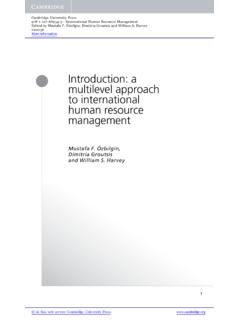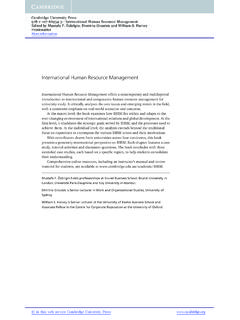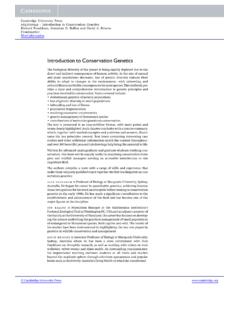Transcription of Cambridge Unive rsit y Pre ss 978-0-521-80447-9- The ...
1 Cambridge University Press 978-0-521-80447-9 - The skeptical environmentalist : measuring the real State of the World Bj rn Lomborg Frontmatter More information The skeptical environmentalist The skeptical environmentalist challenges widely held beliefs that the environmental situation is getting worse and worse. The author, himself a former member of Greenpeace, is critical of the way in which many environmental organizations make selective and misleading use of the scien- tific evidence. Using the best available statistical information from internationally recognized research institutes, Bj rn Lomborg systematically examines a range of major environmental problems that feature prominently in headline news across the world. His arguments are pre- sented in non-technical, accessible language and are carefully backed up by over 2,900 notes allowing readers to check sources for themselves.
2 Concluding that there are more reasons for optimism than pessimism, Bj rn Lomborg stresses the need for clear-headed prioritization of resources to tackle real , not imagined problems. The skeptical environmentalist offers readers a non-partisan stocktaking exercise that serves as a useful corrective to the more alarmist accounts favoured by campaign groups and the media. It is essential reading for anybody with a serious interest in current environmental debates. b j r n l o m b o r g is an Associate Professor of Statistics in the Department of Political Science, University of Aarhus, Denmark. He has published in international journals in the fields of game theory and computer simulations. in this web service Cambridge University Press Cambridge University Press 978-0-521-80447-9 - The skeptical environmentalist : measuring the real State of the World Bj rn Lomborg Frontmatter More information in this web service Cambridge University Press Cambridge University Press 978-0-521-80447-9 - The skeptical environmentalist : measuring the real State of the World Bj rn Lomborg Frontmatter More information Advance praise for The skeptical environmentalist Bj rn Lomborg raises the important question whether the costs of remedying the damage caused by environmental pollution are higher than the costs of the pollution itself.
3 The answer is by no means straightforward. He has written a pioneering book.. Professor Richard Rosecrance, Department of Political Science, University of California, Los Angeles The well-publicized, but failed doomsday predictions made by some well-known environmental- ist writers have inspired a number of rejoinders. This is the best one, by a wide margin. Its author teaches statistics in the Department of Political Science at Aarhus University in Denmark. He has marshaled an extremely impressive array of data to buttress his optimism about long-term and current trends in environment and development. On the environmental side, the book covers tra- ditional problems like food, energy, water, and pollution, but also future problems like biodiver- sity and the greenhouse effect.
4 In each of these areas, he argues that environmental problems can be managed (and in many cases have been managed already), and that trying to turn the clock back will be costlier in economic as well as human terms. On the development side, Lomborg points to encouraging trends in life expectancy, welfare, the decline of population growth, and the reduc- tion of hunger. While he may occasionally make things dif cult for himself by insisting that the world is making progress in virtually every area, this is also what makes the book such an impres- sive tour de force. This volume is a revised version of a much-debated Danish book from 1998, but the documentation is truly international much more so than in the extensive US literature that promotes a similar message. Since theories of environmental con ict are generally predicated on a premise of scarcity, Lomborg's argument is of great potential importance to peace research.
5 Nils Petter Gleditsch, Editor, Journal of Peace Research, Research Professor, International Peace Research Institute, Oslo (PRIO), Professor of International Relations, Norwegian University of Science and Technology (NTNU), Trondheim For many scientists working with developing country issues it has long been dif cult to recon- cile ndings from our eld studies in Africa, Asia and Latin America with the pronouncements from environmental pressure groups in the industrialized world. With much better access to media and politicians a number of in uential institutes and individuals have created images of a rapidly deteriorating world which is not always apparent to a signi cant section of the world pop- ulation. What is even more disturbing is that much of the negative statements on environmental issues and on the global food situation seem to stem from relatively short-term time series, with apparent bias in selection of begin-points and end-points to make development look gloomy.
6 There seems a sharp reluctance in some media and political circles to accept that much progress has been made in providing food for a population which is twice the size of what it was when the Club of Rome issued its doomsday scenarios. Indeed there is reluctance in the North to accept that poor people in the South have mostly done it themselves. It seems almost universally accepted in the North that the forests of the South are disappearing, depriving the globe of its green lungs, whilst serious study of forestry data indicate a much more mixed picture, with India arguably having more forests than 50 years ago. Lomborg's book is a warning to scientists who have abandoned statistical prudence in their work. Anecdotal science can become biassed science or lead to wrong conclusions.
7 The magnify- ing glass of crisis-focussed media, the scramble for competitive grants funding among scientists, and the need for pressure groups to sustain themselves, obscure less obvious and often less dra- matic trends. And in particular they obscure a great deal of good news for the poor. in this web service Cambridge University Press Cambridge University Press 978-0-521-80447-9 - The skeptical environmentalist : measuring the real State of the World Bj rn Lomborg Frontmatter More information The concern for the environment and for the global food situation is honourable. We are all for a better environment and high biodiversity, and against food insecurity. There is a general con- sensus against pollution of the environment, wasteful food production methods, inequalities in access to food.
8 There is a growing awareness of the dangers of global climate change. Lomborg does not argue against these legitimate concerns. He argues against lax and biassed use of data, particularly of time series. He warns that it is degrading science by allowing bits to be picked out of context. He is afraid that pompous statements based on imsy evidence that also attract the media and the politicians constitute a threat to the integrity of science itself. If, in the long run, opportunistic behaviour of scientists leads to disregard of some of the basic tools of science and statistical analysis is certainly one of them then science itself will ultimately be the loser. Lomborg's book questions the scienti c basis why good news is suppressed and bad news ampli ed. But given that the environment is under pressure, it also questions whether we apply the correct remedies.
9 In a world where around billion people live on less that one US dollar a day and probably on less than two dollars a day, we should be seriously concerned about the human dimension of our interactions with the environment. In our efforts to rescue the environ- ment Lomborg suggests that exorbitant sums may be invested in environmental efforts that mean little to the poor, whilst only a handful of countries set aside as much as of their GDP. for development aid. If we are developing a setting, based on awed data analysis, where rich people let butter ies count more heavily in their budgets than hungry and sick people, then we are morally on very thin ice. In a long string of examples Lomborg suggests that there is growing evidence that we may not have got our priority setting right, and that poor people may suffer from our careless handling of scarce data sets.
10 Lomborg questions most of our common views on the environment, the global food situation, and strategies for development assistance to the poor. He may not be right on all issues, but his plea for sci- enti c stringency in analysis, and his exposure of false environmental prophets, are all very credible.. Stein W. Bie. Director General, International Service for National Agricultural Research (ISNAR). Those who feel strongly about poverty always emphasize how deep and widespread it is. But they seldom mention the great amount of people who have been lifted out of poverty over the last few hundred years or, especially, over the last few decades. A similar observation applies to those who care deeply about the environment. They tell us about the inroads of degradation and pollution all over the world, but seldom direct our attention to the results achieved in turning this process around, at least in signi cant parts of the world.










